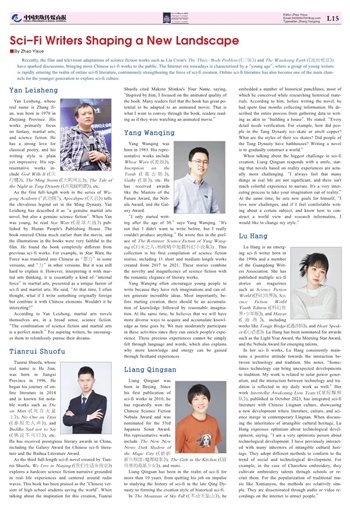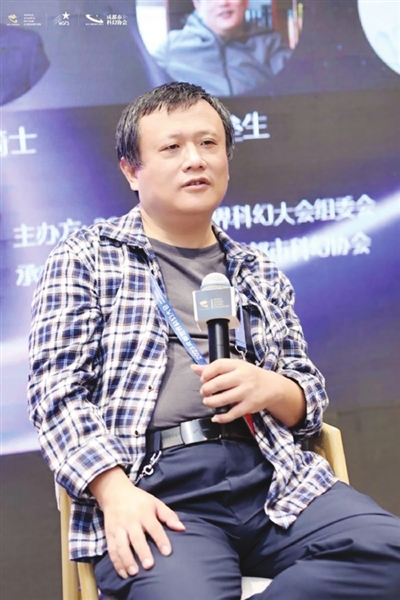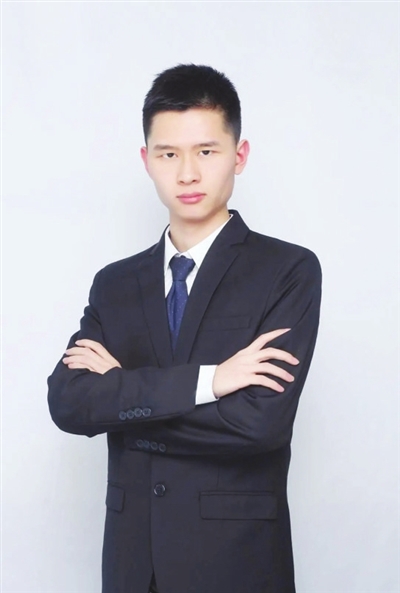■By Zhao Yixue
Recently, the film and television adaptations of science fiction works such as Liu Cixin's The Three-Body Problem (《三体》) and The Wandering Earth (《流浪地球》) have sparked discussions, bringing more Chinese sci-fi works to the public. The Internet era nowadays is characterized by a “young age”, where a group of young writers is rapidly entering the realm of online sci-fi literature, continuously strengthening the force of sci-fi creation. Online sci-fi literature has also become one of the main channels for the younger generation to explore sci-fi culture.
Yan Leisheng
Yan Leisheng, whose real name is Zhang Jian, was born in 1970 in Zhejiang Province. His works primarily focus on fantasy, martial arts, and science fiction. He has a strong love for classical poetry, and his writing style is plain yet impressive. His representative works include God Wills It (《天行健》), The Ming Storm (《大明风云》), The Tale of the Night in Tang Dynasty (《贞观幽明谭》), etc.
As the first full-length work in the series of Wugong Academy (“武功院”), Apocalypse (《天启》) tells the chivalrous legend set in the Ming Dynasty. Yan Leisheng has described it as “a genuine martial arts novel, but also a genuine science fiction”. When Yan was young, he read Star Wars (《星球大战》) published by Hunan People's Publishing House. The book entered China much earlier than the movie, and the illustrations in the books were very faithful to the film. He found the book completely different from previous sci-fi works. For example, in Star Wars, the Force was translated into Chinese as “原力” in some versions, and “力” in other versions. But it was still hard to explain it. However, interpreting it with martial arts thinking, it is essentially a kind of “internal force” in martial arts, presented as a unique fusion of sci-fi and martial arts. He said, “At that time, I often thought, what if I write something originally foreign but combine it with Chinese elements. Wouldn't it be interesting?”
According to Yan Leisheng, martial arts novels themselves are, in a broad sense, science fiction. “The combination of science fiction and martial arts is a perfect match.” For aspiring writers, he encourages them to relentlessly pursue their dreams.
Tianrui Shuofu
Tianrui Shuofu, whose real name is He Jian, was born in Jiangxi Province in 1996. He began his journey of online literature in 2014 and is known for notable works such as Die on Mars (《死在火星上》), No One on Titan (《泰坦无人声》), and Buddha Said not to Say (《佛说不可曰》), etc. He has received prestigious literary awards in China, including the Galaxy Award for Chinese sci-fi literature and the Baihua Literature Award.
As the third full-length sci-fi novel created by Tianrui Shuofu, We Live in Nanjing (《我们生活在南京》) explores a hardcore science fiction narrative grounded in real-life experiences and centered around radio waves. This book has been praised as the “Chinese version of high school students saving the world”. When talking about the inspiration for this creation, Tianrui Shuofu cited Makoto Shinkai's Your Name, saying, “Inspired by him, I focused on the animated quality of the book. Many readers feel that the book has great potential to be adapted to an animated movie. That is what I want to convey through the book, readers reading as if they were watching an animated movie.”
Yang Wanqing
Yang Wanqing was born in 1983. His representative works include Wheat Wave (《麦浪》), Inscription on the Tomb (《墓志铭》), Guilty (《罪》), etc. He has received awards like the Masters of the Future Award, the Nebula Award, and the Galaxy Award.
“I only started writing after the age of 30.” says Yang Wanqing. “It's not that I didn't want to write before, but I really couldn't produce anything.” He wrote this in the preface of The Returner: Science Fiction of Yang Wanqing (《归来之人:杨晚晴中短篇科幻小说集》) . This collection is his first compilation of science fiction stories, including 11 short and medium-length works created from 2017 to 2021. These stories combine the novelty and magnificence of science fiction with the romantic elegance of literary works.
Yang Wanqing often encourages young people to write because they have rich imaginations and can often generate incredible ideas. Most importantly, before starting creation, there should be an accumulation of knowledge followed by reasonable imagination. At the same time, he believes that we will have more diverse ways to acquire and accumulate knowledge as time goes by. We may moderately participate in these activities since they can enrich people's experience. These precious experiences cannot be simply felt through language and words, which also explains why more knowledge and energy can be gained through firsthand experiences.
Liang Qingsan
Liang Qingsan was born in Beijing. Since his first publication of sci-fi works in 2010, he has repeatedly won the Chinese Science Fiction Nebula Award and was nominated for the 53rd Japanese Seiun Award. His representative works include The New New News: Dark Shadow of the Magic City (《新新新日报馆:魔都暗影》), The Girls in the Kitchen (《厨房里的海派少女》), and more.
Liang Qingsan has been in the realm of sci-fi for more than 10 years, from quitting his job on impulse to studying the history of sci-fi in the late Qing Dynasty to forming the creation style of historical sci-fi.
In The Mountain of Sky Fall (《不动天坠山》), he embedded a number of historical punchlines, most of which he conceived while researching historical materials. According to him, before writing the novel, he had spent four months collecting information. He described the entire process from gathering data to writing as akin to “building a house”. He stated: “Every detail needs verification. For example, how did people in the Tang Dynasty ice-skate or smelt copper? What are the styles of their ice skates? Did people of the Tang Dynasty have bathhouses? Writing a novel is to gradually construct a world.”
When talking about the biggest challenge in sci-fi creation, Liang Qingsan responds with a smile, stating that novels based on reality experiences are actually more challenging. “I always feel that many things in real life are not significant, and there isn't much colorful experience to narrate. It's a very interesting process to take your imagination out of reality.” At the same time, he sets new goals for himself, “I love new challenges, and if I feel comfortable writing about a certain subject, and know how to construct a world view and research information, I would like to change my style.”
Lu Hang
Lu Hang is an emerging sci-fi writer born in the 1990s and a member of the Guangdong Writers Association. She has published multiple sci-fi stories on magazines such as Science Fiction World (《科幻世界》), Science Fiction World Youth Edition (《科幻世界·少年版》), and Haiyan (《海燕》), including works like Tongji Bridge (《通济桥》), and Heart Speaker (《心语者》). Lu Hang has been nominated for awards such as the Light Year Award, the Morning Star Award, and the Nebula Award for emerging talents.
In her sci-fi works, Lu Hang consistently maintains a positive attitude towards the interaction between technology and tradition. She notes, “Sometimes technology can bring unexpected developments to tradition. My work is related to solar power generation, and the interaction between technology and tradition is reflected in my daily work as well.” Her work Interstellar Awakening Lion Team (《星际醒狮队》), published in October 2023, has integrated sci-fi literature with Chinese Lingnan culture, showcasing a new development where literature, culture, and science merge in contemporary Lingnan. When discussing the inheritance of intangible cultural heritage, Lu Hang expresses optimism about technological development, saying, “I am a very optimistic person about technological development. I have previously interacted with many inheritors of intangible cultural heritage. They adopt different methods to conform to the trend of social and technological development. For example, in the case of Chaozhou embroidery, they cultivate embroidery talents through schools or recruit them. For the popularization of traditional music like Xintianyou, the methods are relatively simple. They are disseminated through audio or video recordings on the internet to attract people.”







